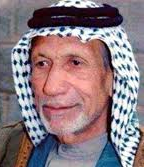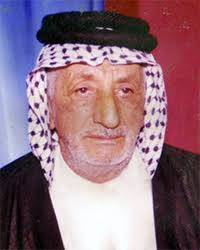Yasin al-Rumeithi is one of the most prominent reciters of poems about the event of Karbala and the heroic roles of Imam Hussein and the other martyrs. He had a unique original technique in reciting, and he used to recite powerful poems that are full of knowledge, values and wisdom. These qualities made him one of the best reciters in the history of Husseini recitation. He served the Husseini gatherings for more than fifty years. He is highly respected by the Iraqi nation, to a degree that he was given a title of ‘the sheikh of reciters’.
Al-Rumeithi was born in 1929 in al-Rumeitha, a town in Samawa in the southern part of Iraq. His original name is Yasin Khudayyir Jabr al-Obaidi, but he was called Yasin al-Rumeithi later. He was raised in a well-known noble family. His father was a sheikh who was a representative (wakil) of one of the grand scholars (marji’s) at the time; Kashif al-Gita’. After graduating from school, Yasin was appointed at al-Rumeitha post office. At the same time, he was reciting poems at the Husseini gatherings in his town. Since Ba’th party agents were fearful from the enthusiastic influence of these poems on people, they ensured he was under strict surveillance, lest the lessons of the story of Imam Hussain (as) motivate them to fight the Yazid of their time. Consequently, his government job became less convenient for him so he left it and suffered from money shortage, then he worked as a builder.
Among the great poets that used to write poems for sheikh al-Rumeithi were abdul Rasul Muhyi al-Din (who was a reciter as well), Abbud Ghafla, Ali al-Tallal, abdul Hussein abu Shaba’ and sheikh Hadi al-Qassab. Those poets were highly educated and conscious about the needs of society. They wrote great pieces of poetry that could teach people many values and plant the love for Allah (swt) and Islam in their hearts. Together, with the great recitation performance of sheikh al-Rumeithi, they produced unique and timeless recitations that have no parallel until today.

Sheikh Yasin al-Rumeithi

Abdul Rasul Muhyi al-Din
Because of these excellent qualities, sheikh Yasin al-Rumeithi became famous and was requested to recite in many other Iraqi cities, such as Najaf, Karbala, Samawa, Basra, and Ba’quba. In 1969, al-Rumeithi was the representative of al-Rumeitha procession group in the Arbaeen ceremony in Karbala. He recited poems by sheikh Hadi al-Qassab, which contained many values and ideas that raise religious awareness. He was arrested at that night during the Arbaeen event. He was released after about 6 months.
Al-Rumeithi used to meet many scholars and poets frequently, especially the scholars of Najaf. Najaf was a city that embraced significant intellectual heritage of literature and poetry and nurtured the development of many scholars until today. In addition to attending the educational gatherings in Najaf, al-Rumeithi used to travel to Najaf to meet the Islamic marji’s such as Muhammed Baqir al-Sadr. He also used to visit the prisoners in abu Ghreib prison and collect money for them at that extremely difficult time.
In the early 1970s, he acquired a great poem from the scholar abdul Rasul Muhyi al-Din, which was full of powerful meanings. It was the iconic poem ‘ya Hussein ib dhamayirna’. The poet abdul Rasul Muhyi al-Din wrote this great poem after an incident happened when he visited al-Rumeitha. One of the Ba’th agents asked him to write a poem to praise the Ba’th party, and they offered him money for that. Hajj Muhyi al-Din refused that offer strongly, telling them that he only writes poems for the sake of Allah and to get intercession of Imam Hussein. After that, he felt so angry about Islam and Imam Hussein’s message, so he wrote this great poem, and he recited it during the Arbaeen event that year. Al-Rumeithi also recited this poem during the Arbaeen later. On that day, the program started with a valuable speech by sheikh abdul Zahra al-Ka’bi[2], describing the events that happened after Karbala, and detailing the march of the captives of ahlul-bayt. Then sheikh Yasin al-Rumeithi recited that poem.
This iconic piece of poetry is considered the shout of truth and goodness in the face of corruption, and it was a call to reject oppression. For the Ba’th regime and other dictators, it was like an earthquake that made their rule unstable. It was highly appreciated by many scholars at that time. For example, the great marji’ Sayed Muhammed Baqir al-Sadr said that if Iraq became a real Islamic country, this poem would be its national anthem. Also it is narrated that Imam Khumeini said: “May Allah bless the one who wrote it, the one who recited it and the one who listens to it”. This poem was so dear to its author, abdul Rasul Muhyi al-Din to a degree that he requested to bury the poem with him, hoping that it would help him get to paradise. They responded to this request and it was buried with him.
In 1977, al-Rumeithi decided to recite the iconic poem ‘ya Hussein ib dhamayirna’ again. He knew that the Ba’th agents would not give him permission to recite it but he decided to recite it anyway during the Arbaeen commemoration in Diyala[1], believing that raising people’s consciousness was worth sacrifice. It was an obligation for all reciter to get government approval on every poem before reciting it. Knowing that they wouldn’t approve that poem, al- Rumeithi made a plan. Instead of telling them he was going to recite that particular poem, he showed them a different one. As usual, the gathering was trespassed by a number of Ba’th party agents who disguised themselves to look like part of the audience. Al-Rumeithi then recited the timely poem titled ‘ya Hussein ib dhamayirna’[3]. On that night he was arrested and tortured. The voice recording of this poem that reached us was from that night.
Al-Rumeithi decided to drift away from the eyes of the Ba’th agents, so he went to Bahrain and Kuwait and continued reciting his great poems there. In 1975 he went back to Iraq, and between the years 1976-1979 he was reciting in Diyala, eastern Baghdad. Amongst his great poems that he recited during that period, was the timely piece ‘ya Hussein ib dhamayirna’, again. After that, he and his family suffered a lot of pain from the crimes of the Ba’th regime. His five sons were imprisoned, in which three of them (Taha, Adil and Aqil) were executed, while the remaining two (Qasim and Haidar) were later freed.
From the 1980’s onwards, the Husseini gatherings were prohibited in Iraq, because the government was frightened that remembering Imam Hussein’s revolution would ignite the love of freedom and truth in the people’s hearts, which could threaten their power. During this time, sheikh Yasin al-Rumeithi stayed in his town, al-Rumeitha, suffering a lot of sorrow about his sons and about the oppression of all other people by the Ba’th regime.
In 1991, and after the Sha’ban revolution (al-intifada al-sha’baniyya)[4] in the southern part of Iraq, al-Rumeithi, who was 62 years old, had to leave his town to survive the mass killing by the government. He ended up in Rafha’ Camp; a temporary camp for Iraqi refugees which was established in a desert in the southern part of Iraq, near the borders of Iraq with Saudi Arabia (Hijaz). In this camp, and being away from the control of Ba’th party, al-Rumeithi continued to recite his great Husseini poems. Later on, he immigrated to America, and continued reciting Husseini poems there. Unfortunately, in 1994 he became sick with cancer, so he started receiving treatment in Detroit and Michigan.
By the end of 2003, and after the fall of Saddam’s government in Iraq in April 2003, al-Rumeithi returned to Iraq to stay in his home town al-Rumeitha, which he longed for many years. Despite being severely ill, he continued reciting Husseini poems, whenever he could. Although, he was feeling miserable because his voice became progressively weaker. On 16 Muharram 1426 (25 February 2005) sheikh Yasin al-Rumeithi died, at the age of 76.
Al-Rumeithi loved Imam Hussein and he was keen to deliver the Husseini message of reform, justice and strong faith until the last breath. No wonder that he died in Muharram, only few days after Ashura’. Though he left this world, his legacy stayed in people’s hearts and minds, and his powerful recitations are still a favourite to many people. Such faithful and honourable individuals are rare to find.
I advise young Muslims in our community who are familiar with Arabic language to listen to the recitation of this great scholar, and try to understand the words and take these messages to practice. I also advise young people who wish to be reciters of Husseini poems to follow the example of this knowledgeable person, deal with educated and wise poets, be original, and have a very pure intention (niyya) like al-Rumeithi. Most importantly, everyone should never forget the eternal poem ‘ya Hussein ib dhamayirna’ and keep remembering it each year, especially during the Arbaeen event, where it was recited for the first time. May Allah bless sheikh Yasin al-Rumeithi and grant him the best reward in Paradise.
You can listen to the recitation here:
By Dr. Iman Al-Attar
[1] Arbaeen is an annual event where people commemorate 40 days after the martyrdom of Hussein and his companions in Ashura’
[2] For more information about al-Ka’bi refer to our previous article here.
[3] In Arabic its called “يا حسين بضمايرنا”
[4] Sha’ban Revolution is a revolution led by Iraqi people, mainly in the southern parts of Iraq, which has a Shia Muslim majority. This revolution was a reaction to the devastated consequences of the invasion of Saddam Hussein to Kuwait in 1990, and the war against the Islamic Republic of Iran, which took place between 1980 and 1988. This great revolution started in March 1990, Sa’ban 1411. In only 15 days, the Iraqi people controlled 15 out of 18 governorates in Iraq. Yet, with the help of USA, the Ba’th regime suppressed this revolution harshly. As a result, tens of thousands of innocent people were martyred, and about 2 million people became homeless.






2 Comments
Zaineb
Sat 27 Safar 1441AH 26-10-2019AD at 10:56 pmAl Salam alaykum,
Thank you for this great piece of historical writing. It is very valuable to our Islamic Australian and Iraqi heritage. I look forward to reading more.
Ladies as Leaders
Sat 27 Safar 1441AH 26-10-2019AD at 11:26 pmAlaikum alsalam, you’re welcome dear. It is very important for all of us to learn about our history. You can also read the article about Hamza al-Saghir, which was published few weeks ago